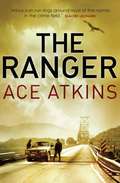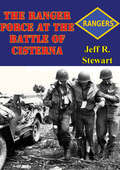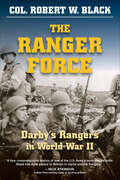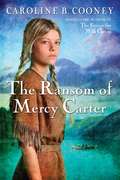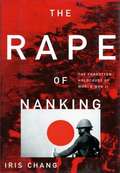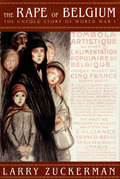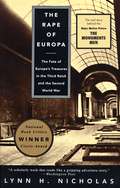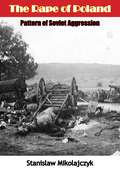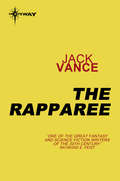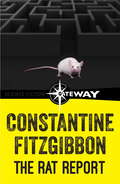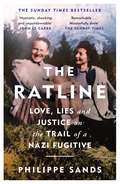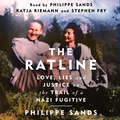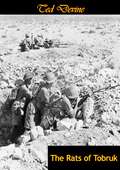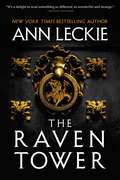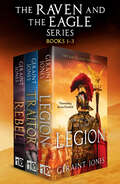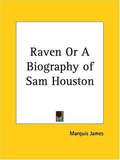- Table View
- List View
The Rancher Returns: The Rancher Returns The Pregnancy Proposition Convenient Cowgirl Bride (The Westmoreland Novels #1)
by Brenda JacksonProtecting the woman he can&’t resist…The Rancher Returns by New York Times Bestselling Author Brenda Jackson Returning from active duty to find his ranch being dug up by a beautiful stranger isn&’t the homecoming navy SEAL Gavin Blake expected. Layla Harris is convinced there&’s buried treasure on his land. But the only treasure this wealthy rancher wants to uncover is the professor&’s secret desires! When Layla unearths family secrets—and mysterious threats—he vows to do whatever it takes to protect her. Even as her revelations change everything… FREE BONUS STORY INCLUDED IN THIS VOLUME!Playing with Temptation by Reese Ryan Walking away from the man she loved seven years ago is the biggest regret of media consultant Kendra Williams&’s life. Now her son needs his father…and Kendra needs to win back pro footballer Nate Johnston&’s trust. After she broke his heart, repairing his career is the least she can do. Powerful passion still smolders between them, but will a jealous ex sabotage their second chance at a future?New York Times Bestselling Author Brenda Jackson
The Rancher Who Took Her In: Texas Born Diamond In The Ruff The Rancher Who Took Her In (The Bachelors of Blackwater Lake #4)
by Teresa SouthwickA runaway bride. A single-dad rancher. Who said opposites don't attract? Perhaps applying to a Help Wanted ad in her wedding gown wasn't the best way to make a first impression on a job interview! But Kate Scott needed to escape the humiliation of her hastily called-off wedding. Cabot Dixon's Montana ranch, if not the most welcoming place in the West, seemed like the perfect place to keep a low profile. Cabot was a rancher-not a couples' counselor!-and his past experiences with women (plus the dusty wedding dress) told him Kate was a runner. So when his young son, Tyler, attached himself to Kate and made not-so-subtle hints about wanting her as his mom, the single dad wondered what he'd opened himself up to...especially when he realized that he'd do anything to have the runaway bride by his side for keeps!
The Rancher's Forever Family (Texas Cowboys & K-9s #1)
by Sasha SummersShe was looking for a rescue…But he’s the one who was saved.Sergeant Hayden Mitchell’s mission: give every canine veteran the perfect forever home. But when it comes to Sierra, a sweet Labrador, Hayden isn’t sure Lizzie Vega fits the bill. Her PTSD and city lifestyle raise concerns, even as her vulnerability—and gorgeous eyes—draws him closer. When a storm leaves her stranded at his ranch, the hardened ex-military man wonders if Lizzie is the perfect match for Sierra…and him…From Harlequin Special Edition: Believe in love. Overcome obstacles. Find happiness.Texas Cowboys & K-9sBook 1: The Rancher’s Forever Family
The Rancher's Holiday Arrangement (Mercy Ranch #7)
by Brenda MintonTheir fake engagement might fix everything—until it starts to feel real . . . Rancher and injured war veteran Joe Lawson prefers his own company—until he rescues Daisy West and her twin foster babies from a car accident. When Daisy returns the favor by announcing their fake engagement to save him from his meddling family, Joe’s quiet life in Oklahoma turns upside down.Now he’s engaged to his boss’s daughter—and if he’s not careful, this cowboy might just fall hat over heels for her before Christmas . . .
The Rancher's Holiday Hope (Mercy Ranch #5)
by Brenda MintonHe returned for his sister’s Christmas wedding—not a romance of his own. But her planner’s the gift he never expected . . . Back in his Oklahoma hometown to help his family, rancher-turned-businessman Max St. James has no intention of staying beyond the holidays. But the more time he spends with his sister’s wedding planner, Sierra Lawson, the more the small town he left behind feels like home again. The beautiful woman is still struggling with PTSD from her time in captivity in Afghanistan—and yet she possesses a fierce determination when it comes to protecting the vulnerable.Falling for Sierra wasn’t part of his plan. But he’s never wanted anything more for Christmas . . .
The Ranger (Quinn Colson #1)
by Ace AtkinsNortheast Mississippi is hill country, rugged and notorious for outlaws since the Civil War, where killings are as commonplace as they were in the Old West. To Quinn Colson, just back from a tour of Afghanistan, it's home. But home has changed. Quinn returns to a place overrun by corruption. His uncle, the county sheriff, is dead - officially it was suicide, but others whisper murder. In the days that follow, it will be up to Colson, now an Army Ranger, to discover the truth - not only about his uncle, but also about his family, friends, hometown and himself. But once the truth is uncovered, there is no turning back.
The Ranger Force At The Battle Of Cisterna
by Jeff R. StewartThe purpose of this research project is to determine what factors led to the operational failure and destruction of the 1st and 3rd Ranger Battalions during the battle of Cisterna on 30 January 1944. Subordinate questions include: Why did experienced combat commanders, like General Truscott and Colonel Darby, utilize the lightly armed Ranger Force against a fortified town? Did the training level of the new ranger replacements compromise the infiltration and affect the outcome? Did the Germans detect the infiltration and emplace an ambush for the unsuspecting Ranger Force? What was the intelligence preparation of the battlefield, and how did it affect the plan? Did General Truscott's and Colonel Darby's previous experience lead to assumptions about effectiveness of the Ranger Force in such a mission?
The Ranger Force: Darby's Rangers in World War II
by Colonel Robert W BlackOne of the most famous units of World War II and all of military history. First Americans to see active combat in the European theater. Expands on events described in Rick Atkinson's An Army at Dawn and The Day of Battle.
The Ranger Way: Living the Code On and Off the Battlefield
by Kris ParontoThis USA Today–bestselling self-help memoir from a former Army Ranger and hero of the 2012 Benghazi seige “will provide a master class in how to succeed” (Marty Skovlund, Jr., author of Violence of Action: The Untold Stories of the 75th Ranger Regiment in the War on Terror).In The Ranger Way, Kris “Tanto” Paronto shares stories from his training experiences that played a role in his team's heroic response in Benghazi on September eleven, 2012. Being a Ranger is, by design, not for everyone, but anyone can use the expectations and techniques of Ranger culture to achieve personal victory. Tanto shows you how to define your mission, set goals that are in alignment with your values, and develop a battle plan that will maximize your chances of success.Tanto uses his experiences in Basic and Ranger Training to explore how to deal with mistakes and disappointment like a leader, accept responsibility, and turn every obstacle into an opportunity for growth. You will learn why service and sacrifice will help you succeed—and how the power of humility, strength, faith, and brotherhood will sustain you on the road to accomplishing your mission.“Tanto's book is proof that Rangers lead the way both in and out of the military. This is a must-read for anyone who wants to improve their life.”―Brandon Webb, former Navy SEAL sniper and New York Times–bestselling author of The Red Circle“Kris Paronto epitomizes the courage, leadership, and discipline that selfless Americans who have fought for and defended freedom and liberty have exhibited from the founding of this nation to the present.”―David A. Clarke Jr., sheriff of Milwaukee County, Wisconsin
The Ranger's Rodeo Rebel
by Pamela BrittonIn July 2016 HARLEQUIN AMERICAN ROMANCE will become HARLEQUIN WESTERN ROMANCE. Same great stories, new name! A PROMISE TO PROTECT Under the guise of taking over the family's rodeo act, former Army Ranger Chance Reynolds is actually home to protect their star trick rider, Carolina Cruthers, from her ex. Keeping an eye on the spunky blonde isn't a problem. Keeping things professional? That's getting harder every day. Though Caro feels safe with Chance, she knows getting involved with her boss would be a bad idea, never mind dragging him into her messy past. But life on the rodeo trail draws them closer, and what started as a short-term arrangement suddenly feels anything but temporary. Can Chance convince Caro that they should team up forever?
The Ransom of Mercy Carter
by Caroline B. CooneyDeerfield, Massachusetts is one of the most remote, and therefore dangerous, settlements in the English colonies. In 1704 an Indian tribe attacks the town, and Mercy Carter becomes separated from the rest of her family, some of whom do not survive. Mercy and hundreds of other settlers are herded together and ordered by the Indians to start walking. The grueling journey -- three hundred miles north to a Kahnawake Indian village in Canada -- takes more than 40 days. At first Mercy's only hope is that the English government in Boston will send ransom for her and the other white settlers. But days turn into months and Mercy, who has become a Kahnawake daughter, thinks less and less of ransom, of Deerfield, and even of her "English" family. She slowly discovers that the "savages" have traditions and family life that soon become her own, and Mercy begins to wonder: If ransom comes, will she take it?From the Hardcover edition.
The Rape Of Nanking: The Forgotten Holocaust Of World War II
by Iris ChangIn December 1937, in what was then the capital of China, one of the most brutal massacres in the long annals of wartime barbarity occurred. The Japanese army swept into the ancient city of Nanking (Nanjing) and within weeks not only looted and burned the defenseless city but systematically raped, tortured, and murdered more than 300,000 Chinese civilians. Amazingly, the story of this atrocity-one of the worst in world history-continues to be denied by the Japanese government.Based on extensive interviews with survivors and newly discovered documents in four different languages (many never before published), Iris Chang, whose own grandparents barely escaped the massacre, has written what will surely be the definitive, English-language history of this horrifying episode-one that the Japanese have tried for years to erase from public consciousness.The Rape of Nanking tells the story from three perspectives: that of the Japanese soldiers who performed it; of the Chinese civilians who endured it; and finally of a group of Europeans and Americans who refused to abandon the city and were able to create a safety zone that saved almost 300,000 Chinese. It was Chang who discovered the diaries of the German leader of this rescue effort, John Rabe, whom she calls the "Oskar Schindler of China." A loyal supporter of Adolf Hitler but far from the terror planned in his Nazi-controlled homeland, he worked tirelessly to save the innocent from slaughter.But this book does more than just narrate details of an orgy of violence; it attempts to analyze the degree to which the Japanese imperial government and its militaristic culture fostered in the Japanese soldier a total disregard for human life.Finally, it tells one more shocking story: Despite the fact that the death toll at Nanking exceeded the immediate deaths from the atomic blasts at Hiroshima and Nagasaki combined (and even the total wartime casualty count of entire European countries), the Cold War led to a concerted effort on the part of the West and even the Chinese to court the loyalty of Japan and stifle open discussion of this atrocity. Indeed, Chang characterized this conspiracy of silence, which persists to this day, as "a second rape."
The Rape of Belgium
by Larry ZuckermanIn August 1914, the German Army invaded the neutral nation of Belgium, violating a treaty that the German chancellor dismissed as a "scrap of paper." The invaders terrorized the Belgians, shooting thousands of civilians and looting and burning scores of towns, including Louvain, which housed the country's preeminent university. The Rape of Belgium recalls the bloodshed and destruction of the 1914 invasion, and the outrage it inspired abroad. Yet Larry Zuckerman does not stop there, and takes us on a harrowing journey over the next fifty months, vividly documenting Germany's occupation of Belgium. The occupiers plundered the country, looting its rich supply of natural resources; deporting Belgians en masse to Germany and northern France as forced laborers; and jailing thousands on contrived charges, including the failure to inform on family or neighbors. Despite the duration of the siege and the destruction left in its wake, in considering Belgium, neither the Allies nor the history books focused on the occupation, and instead cast their attention almost wholly on the invasion. Now, The Rape of Belgium draws on a little-known story to remind us of the horrors of war. Further, Zuckerman shows why the Allies refrained from punishing the Germans for the occupation and controversially suggests that had the victors followed through, Europe's reaction to the rise of Nazi Germany might have taken a very different course.
The Rape of Europa: The Fate of Europe’s Treasures in the Third Reich and the Second World War
by Lynn H. NicholasWinner of the National Book Critics Circle Award. The cast of characters includes Hitler and Goering, Gertrude Stein and Marc Chagall--not to mention works by artists from Leonardo da Vinci to Pablo Picasso. And the story told in this superbly researched and suspenseful book is that of the Third Reich's war on European culture and the Allies' desperate effort to preserve it. From the Nazi purges of "Degenerate Art" and Goering's shopping sprees in occupied Paris to the perilous journey of the Mona Lisa from Paris and the painstaking reclamation of the priceless treasures of liberated Italy, The Rape of Europa is a sweeping narrative of greed, philistinism, and heroism that combines superlative scholarship with a compelling drama. "Nicholas knows the art world as well as any military historian knows his battlefield. ... Her work deserves the widest reading."--New York Times Book Review.
The Rape of Poland: Pattern of Soviet Aggression
by Stanislaw MikolajczykFirst published in 1948, this is the inside story by the former head of the Polish Government in Exile, and more recently head of the Peasants’ Party in Poland, which tried to find a way to co-operate with the Soviets.“A raging question in Poland has become, ‘How long will it take them to communize us completely?’“To my mind, however, the question is badly framed. I am convinced that human beings cannot be converted to communism if that conversion is attempted while the country concerned is under Communist rule. Under Communist dictatorship the majority become slaves—but men born in freedom, though they may be coerced, can never be convinced. Communism is an evil which is embraced only by fools and idealists not under the actual heel of such rule.“The question should be phrased: How long can a nation under Communist rule survive the erosion of its soul?”—Stanislaw Mikolajczyk, Preface
The Rapparee
by Jack VanceThe Rapparee is Jack Vance's preferred title for the novel previously published as The Space Pirate and The Five Gold Bands.Five gold bracelets imprinted with cryptic messages were the clues that set Paddy Blackthorn off on a riotous galactic treasure hunt. But Paddy found himself not only the hunter but also the hunted for the armbands had been left to him by his would-be killers, the Rulers of the Five Planets.All Jack Vance titles in Gateway use the author's preferred texts, as restored for the Vance Integral Edition (VIE), an extensive project masterminded by an international online community of Vance's admirers. In general, we also use the VIE titles, and have adopted the arrangement of short story collections to eliminate overlaps.
The Rat Report
by Constantine FitzgibbonA rat called Crocus, imprisoned in the laboratory of an Irish scientist Dr Dresmond Burke, is transmitting information to a person or persons unknown in another galaxy. His information is in the form of a report on man's history and development over the past 500 years. And it ends with Crocus's shadowy imprecise foreknowledge of what will become of the human race in the future.Crocus is sharp, wise and cleverer by far than most men - as, he claims, the whole race of rats is. He comments astutely on man's spiritual decline; on the collapse of formalised religion and the obsession with things scientific; with man's mistakes in numerology, and therefore in mathematics and astronomy; and with his loss of faith in all that is supernatural or extra-sensory. But Crocus himself is being monitored by Dr Burke, who is beaming the rat's thoughts through an elderly lady medium and on to a tape recorder. The message as transmitted is unintelligible, but Dr Burke thinks he knows a way to interpret it. This involves outside help...the help of the army...of foreign powers. And then he discovers that what he has learned through Crocus is already known to a small band of resolute and dedicated men. Man's thought-processes can be interfered with, thought-waves can move material objects, and this knowledge is being put to a use more potent than the nuclear bomb...
The Rat Report
by Constantine FitzgibbonA rat called Crocus, imprisoned in the laboratory of an Irish scientist Dr Dresmond Burke, is transmitting information to a person or persons unknown in another galaxy. His information is in the form of a report on man's history and development over the past 500 years. And it ends with Crocus's shadowy imprecise foreknowledge of what will become of the human race in the future.Crocus is sharp, wise and cleverer by far than most men - as, he claims, the whole race of rats is. He comments astutely on man's spiritual decline; on the collapse of formalised religion and the obsession with things scientific; with man's mistakes in numerology, and therefore in mathematics and astronomy; and with his loss of faith in all that is supernatural or extra-sensory. But Crocus himself is being monitored by Dr Burke, who is beaming the rat's thoughts through an elderly lady medium and on to a tape recorder. The message as transmitted is unintelligible, but Dr Burke thinks he knows a way to interpret it. This involves outside help...the help of the army...of foreign powers. And then he discovers that what he has learned through Crocus is already known to a small band of resolute and dedicated men. Man's thought-processes can be interfered with, thought-waves can move material objects, and this knowledge is being put to a use more potent than the nuclear bomb...
The Ratline: Love, Lies and Justice on the Trail of a Nazi Fugitive
by Philippe Sands*THE SUNDAY TIMES BESTSELLER* FROM THE AUTHOR OF EAST WEST STREETAs Governor of Galicia, SS Brigadeführer Otto Freiherr von Wächter presided over an authority on whose territory hundreds of thousands of Jews and Poles were killed, including the family of the author's grandfather. By the time the war ended in May 1945, he was indicted for 'mass murder'. Hunted by the Soviets, the Americans, the Poles and the British, as well as groups of Jews, Wächter went on the run. He spent three years hiding in the Austrian Alps, assisted by his wife Charlotte, before making his way to Rome where he was helped by a Vatican bishop. He remained there for three months. While preparing to travel to Argentina on the 'ratline' he died unexpectedly, in July 1949, a few days after spending a weekend with an 'old comrade'.In The Ratline Philippe Sands offers a unique account of the daily life of a senior Nazi and fugitive, and of his wife. Drawing on a remarkable archive of family letters and diaries, he unveils a fascinating insight into life before and during the war, on the run, in Rome, and into the Cold War. Eventually the door is unlocked to a mystery that haunts Wächter's youngest son, who continues to believe his father was a good man - what happened to Otto Wächter, and how did he die? *** 'A gripping adventure, an astounding journey of discovery and a terrifying and timely portrait of evil in all its complexity, banality, self-justification and madness. A stunning achievement' STEPHEN FRY 'Hypnotic, shocking and unputdownable' JOHN LE CARRÉ'Breathtaking, gripping, and ultimately, shattering. Philippe Sands has done the unimaginable: look a butcher in the eye and tell his story without flinching' ELIF SHAFAK'A triumph of research and brilliant storytelling' ANTONY BEEVOR
The Ratline: Love, Lies and Justice on the Trail of a Nazi Fugitive
by Philippe Sands*FROM THE BESTSELLING AUTHOR OF EAST WEST STREET* As Governor of Galicia, SS Brigadeführer Otto Freiherr von Wächter presided over an authority on whose territory hundreds of thousands of Jews and Poles were killed, including the family of the author's grandfather. By the time the war ended in May 1945, he was indicted for 'mass murder'. Hunted by the Soviets, the Americans, the Poles and the British, as well as groups of Jews, Wächter went on the run. He spent three years hiding in the Austrian Alps, assisted by his wife Charlotte, before making his way to Rome where he was helped by a Vatican bishop. He remained there for three months. While preparing to travel to Argentina on the 'ratline' he died unexpectedly, in July 1949, a few days after spending a weekend with an 'old comrade'.In The Ratline Philippe Sands offers a unique account of the daily life of a senior Nazi and fugitive, and of his wife. Drawing on a remarkable archive of family letters and diaries, he unveils a fascinating insight into life before and during the war, on the run, in Rome, and into the Cold War. Eventually the door is unlocked to a mystery that haunts Wächter's youngest son, who continues to believe his father was a good man - what happened to Otto Wächter, and how did he die? *** 'A gripping adventure, an astounding journey of discovery and a terrifying and timely portrait of evil in all its complexity, banality, self-justification and madness. A stunning achievement' STEPHEN FRY 'Hypnotic, shocking and unputdownable' JOHN LE CARRÉ'Breathtaking, gripping, and ultimately, shattering. Philippe Sands has done the unimaginable: look a butcher in the eye and tell his story without flinching' ELIF SHAFAK'A triumph of research and brilliant storytelling' ANTONY BEEVOR
The Rats of Tobruk
by John Berchmans DevineTHIS is the personal record of nine months spent as a medical officer on active service in Libya. Its purpose is to endeavour to show what a great warrior the ordinary Australian soldier really is, and with what light-hearted bravery and endurance he faces up to discomfort and death. It is written as a personal record to gain continuity, and always in the spirit of an onlooker who sees much of the play. It is neither a scientific document nor history, and I cannot vouch for the accuracy of many of the stories set down herein, but even if they are not wholly true, they are still characteristic. No names are included, and it is purely coincidental that most of the happenings herein described are fact and not fiction.Some of the illustrations are taken from drawings and oil sketches made by the author on the spot, and the remainder are photographs taken with a miniature camera and developed in Tobruk. "Major Devine's little volume of personal experiences brings the whole picture of the dust and desert, of stone and rock, of battered equipment, of patient endurance, back before one's eyes. It translates into human individual terms all the planning and endeavour and struggle that characterized the splendid defence of Tobruk by our own 9th Australian Division and by other British troops from the United Kingdom and troops from India who were there with them in that epic siege."--T. A. Blamey General, Commander-in-Chief, Australian Military Forces (Foreword to "The Rats of Tobruk")
The Raven Hovers
by Teresa CraneTwo brothers, an epic conflict and a dark family secret. An extraordinary novel from Teresa Crane, author of the bestselling The Italian HouseStefan and Marik Anderson: two men bound together by blood and divided by a hatred sown since birth... Stefan, the illegitimate outcast, has lived a tough and difficult life on the wild Essex marshes: Marek, diffident and intelligent, has been brought up in easy and affluent London.It is only with the outbreak of the Second World War that their lives change. As the conflict rages around them Stefan, a hero of the Polish partisan movement, and Marek reluctantly embark on a secret mission to support the cause and uncover the Nazi’s ‘retailiation weapon’. Yet still the bitter past is a source of discord.Danusia, Stefan's lover and fellow freedom-fighter is startled and intrigued by their enmity. And it is to Marek she confides a secret that she knows will cost her her life if Stefan should discover it...A novel of war, love and desperate secrets, The Raven Hovers will keep you gripped until the very end. Perfect for fans of Kate Morton, Katie Fforde and Nicola Cornick.
The Raven Tower
by Ann LeckieGods meddle in the fates of men, men play with the fates of gods, and a pretender must be cast down from the throne in this masterful first fantasy novel from Ann Leckie, New York Times bestselling author and winner of the Hugo, Nebula, and Arthur C. Clarke Awards. For centuries, the kingdom of Iraden has been protected by the god known as the Raven. He watches over his territory from atop a tower in the powerful port of Vastai. His will is enacted through the Raven's Lease, a human ruler chosen by the god himself. His magic is sustained via the blood sacrifice that every Lease must offer. And under the Raven's watch, the city flourishes.But the power of the Raven is weakening. A usurper has claimed the throne. The kingdom's borders are tested by invaders who long for the prosperity that Vastai boasts. And they have made their own alliances with other gods.It is into this unrest that the warrior Eolo--aide to Mawat, the true Lease--arrives. And in seeking to help Mawat reclaim his city, Eolo discovers that the Raven's Tower holds a secret. Its foundations conceal a dark history that has been waiting to reveal itself...and to set in motion a chain of events that could destroy Iraden forever.
The Raven and Eagle series
by Geraint JonesThe Roman Empire looms large. Battle and glory await… Includes all three books in The Raven and Eagle series; Legion, Traitor and Rebel.Legion: AD 6: The greatest army assembled in a generation prepares to march. But not Legionary Corvus. He and half his legion are to be left behind to garrison the province of Pannonia: a wild place where the mountains are as deadly as any foe. Corvus despairs as he watches his closest friend Marcus march to war, not knowing that his own eager thirst for battle is about to be quenched. A huge rebel army has revolted against the Empire, and Corvus and his few comrades are all that stand against them…Traitor: In the bloodied mountains of Pannonia, the Roman army struggles to put down a brutal rebellion. Corvus is now the standard bearer of the Eighth Legion, which has borne the brunt of the fighting. The famed soldier has lost one comrade after another, and now his oldest friend, Marcus, has betrayed him, shaking him to his core. Sick of the conflict, Corvus deserts his legion and rides for home to end his days in peace. But there is no escaping Rome, or its vengeance. Corvus might want a simple life, but when tragedy strikes, he is hauled back into the savage war. And this time, he won’t be fighting on the Roman side…Rebel: At last, the Roman Empire is winning one of its most savage wars. King Pinnes is dead. The Pannonian tribes have surrendered. Only the Dalmatians under Bato remain in the fight, and this brutal leader holds the life of a former Roman standard bearer in his hands. Corvus is spared only on condition that he continues to fight against Rome as a rebel, but his enemies are everywhere. Not only do the Romans want his head, but the treacherous Ziva – his supposed ally – is a constant threat. With the Pannonians knocked out of the war, the entire might of Rome is directed against Bato’s army. Legion after legion covers the landscape. Sieges are laid. Towns burn. Thousands die. There is no mercy. And there, in the fire of the rebellion’s last stand, Corvus must face his greatest betrayer…A gritty historical adventure series, perfect for fans of Ben Kane and Simon Scarrow.Praise for Geraint Jones‘Outstanding… Bold, violent, but also deeply introspective, this book offers insight not only into history, but also the mind of the soldier. I couldn’t put it down.’ Steven Pressfield, author of Gates of Fire‘Blood and guts, but also a clever exploration of the moral ambiguity of war and loyalty to a flag.’ Mail on Sunday‘Brutal, audacious, and fast paced.’ Anthony Riches, author of the Empire series.‘Historical fiction written by a real war veteran who knows all there is to know about blood and bonding in battle.’ Weekend Sport‘The series of great books featuring Corvus goes from strength to strength. Great characters who bring the story to life. Brilliant in every way.’ *?*?*?*?*? Reader review‘Supreme writing… Geraint has a brilliant unique style that makes this hard to put down. Excellent and up there with the best.’ *?*?*?*?*? Reader review‘I felt transported into another world. Brutal, raw and completely compelling. A masterclass in historical fiction.’ *?*?*?*?*? Reader review‘Complex, dark, awesome. Could barely put this book down, really loved the story and this author knows how to keep his audience engaged.’ *?*?*?*?*? Reader review
The Raven: A Biography of Sam Houston
by Marquis JamesThis work tells the tale of Sam Houston: United States Senator; military hero; protégé of Andrew Jackson and Tennessee's Young Man of Destiny; General and President of the Texas Republic; Ambassador of the Cherokee Nation of Indians and adoptee of the Cherokee people; and as trouble brewed with Mexico, he was chosen commander in chief of the Texan provisional government.<P><P> Pulitzer Prize Winner





